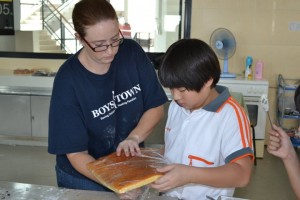
As part of our series about different types of youth work, this week we have an interview with Shae Pepper who, in addition to being a Prevention Training Specialist and Girl Scout Troop Leader, used to do schools work in the UK.
1. What type of youth work did you do?
I was a Schools Project Coordinator in the UK. I also did schools work in Thailand and currently do prevention work in schools in the US.
2. What did you do in an average week?
I led small groups of students in year 9 and year 10. The program was based on sessions such as life skills, local volunteering, global charity fundraising, a media project and a one week residential (retreat). The youth worked towards a Youth Achievement Bronze Award throughout the program.
I worked with a different group each day for six hours; we picked them up from school, dropped them back off at the end of the day and served them lunch.
I also did one-to-one mentoring on Fridays and had an administrative day on Mondays.
3. How long were you a schools worker?
I did that specific role for 2 & 1/2 years in the UK. I also work in schools now as part of my role as a Prevention Specialist.
4. What other types of youth work have you done previously?
Youth participation programs, social-inclusion/social-enterprise programs, faith-based youth ministry, youth re-entry program design, Girl Scout troop leadership, prevention services and project-based education programs.
5. What age range did you work with?
I worked with youth who were between the ages of 11-14, my preferred age group.
6. What was unique about being a Schools Project Coordinator?
We were able to work with the youth about school issues and social skills in partnership with the school, and yet the youth were released from school into our care one full day a week for the entire school year.
7. What were some of the good things about schools work?
I’m passionate about youth finishing school – I myself LOVE school and learning – so it’s great to work in an environment that fosters (or should) a love of learning. One of the reasons I’m not a teacher though is that I love informal education rather than formal teaching methodology. Therefore, youth work in a school fits nicely into both parts of me that want to teach and educate while still maintaining a less formal relationship with youth.
As a morning person, I also loved the 6am – 3pm schedule.
8. What were some of the challenges of it?
The main challenge was proving its worth so that youth could continue to be released for groups. Over the years, it got harder and harder to get youth released for a full school day into our care, especially when there was such a focus on academics. The program really had to show high retention and achievement rates.
9. Why were you passionate about schools work?
I love schools work – even now. As I said before, it works well with the type of youth worker that I am. I love to teach and I love to be informal in my relationships with young people. Being flexible on my own curriculum also has the advantage of being able to stop and work through issues with youth that might otherwise have to be dealt with punitively in a classroom setting.
Even though all youth aren’t college-bound, a love of learning is important to instill, even if it’s not in academic pursuits. It will create innovative and motivated youth and I love that schools work has the potential to bring a joy of learning new things to the school environment.
10. What would you recommend for someone wanting to get into schools work?
Remember that there are all different kinds of schools work out there – do your research and volunteer first. Then you can know if teaching, careers guidance, youth work, prevention services, graduation coaching, classroom assistant, etc. is right for you.
11. Is there any special training or qualifications required?
There wasn’t in the role I had, but you should check with the organizations and agencies in your area doing schools work to find out more.
About Shae:
Shae Pepper has been a Professional Youth Worker for eight years and a Volunteer Youth Worker for nine years. She has a Master’s in Youth Work and Community Development from DeMontfort University in Leicester, England. Shae has provided training for youth workers in England, the USA and Rwanda and has worked with young people aged 8-21 in England, Rwanda, the USA and Thailand.
Please feel free to use the comments below if you have any questions about Schools Work. If you also do Schools Work, we’d love to hear about your experiences in the comments too.
You can also connect with us by:
- Signing up to receive our posts via email
- Following us on Twitter
- Liking us on Facebook
- Signing up to our RSS feed
 Mince is a youth worker in England who doesn’t smoke but does have a lovely posh coat.
Mince is a youth worker in England who doesn’t smoke but does have a lovely posh coat.
